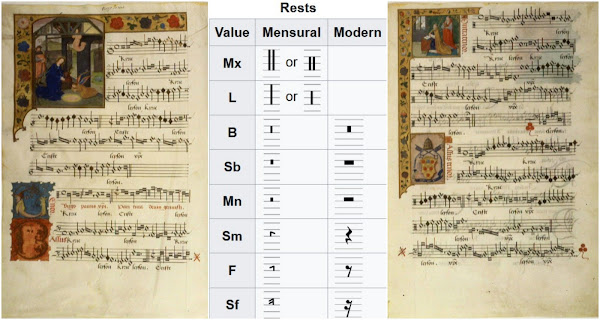"The rest is silence": Musical Notation, Nihilism, and Ambiguity
Too few critics and scholars consider that Hamlet is making a musical pun for Horatio (and for theater audiences) with his last breath:
The rest (in musical notation) is silence.
Hamlet is, after all, not only the son of King Hamlet and Queen Gertrude, but also the spiritual offspring of Yorick the fool.
His first words in the play involve a sarcastic pun: His uncle Claudius calls Hamlet his son, and Hamlet says he is “too much in the sun.” (1.2.69) [1]
He makes fun of Polonius, who deserves it:
POLONIUS: What do you read, my lord?
HAMLET: Words, words, words.
POLONIUS What is the matter, my lord?
HAMLET Between who?
POLONIUS I mean the matter that you read, my lord.
HAMLET Slanders, sir; for the satirical rogue says here
that old men have gray beards, that their faces are
wrinkled, their eyes purging thick amber and
plum-tree gum, and that they have a plentiful lack of
wit, together with most weak hams; all which, sir,
though I most powerfully and potently believe, yet I
hold it not honesty to have it thus set down; for
yourself, sir, shall grow old as I am, if, like a crab,
you could go backward.
(2.2.211-222.)
When Polonius complains that the first player’s speech is too long, Hamlet comes back:
“It shall to the barber's, with your beard….
He's for a jig or a tale of bawdry, or he sleeps.” (2.2.524-6)
In other words, the length of your beard is the problem, not the speech, and Polonius would rather dance or watch a jig, or hear a bawdy tale, or else he gets bored and sleeps.
Hamlet calls Rosencrantz and Guildenstern sponges who want to soak up the king’s favors (4.2.12-21).
He tells Claudius that he can seek the dead Polonius in heaven, or if not there, he can seek him himself in the other place (because you’re bound for hell, Uncle). (4.3.37-39)
He makes fun of Osric, who is far too enthusiastic about hats and the excitement of being at court (5.92-208).
As others have noted, in a Denmark that lacks a court fool, Hamlet takes on that role with relish.
This is not to say that Hamlet's last words are only, merely a pun about musical notation. Most puns depend on at least two meanings:
If I apologize for subjecting you to pun-ish-ment, one meaning:
I've done something you may find painful.
Another: I'm apologizing for my puns.
In the same way, yes, Hamlet's last words can be taken seriously, as a moment of existential doubt in the face of the Great Void, or at least a consideration that as a mortal being, he will no longer be able to argue his case (or joke about it) once he dies.
But if Hamlet came in with a pun (too much in the sun), it could make sense for him to go out with a pun (“The rest is silence”).
It therefore may have been Shakespeare's intention for us to be open to the mystery of possibilities in Hamlet's last words: He is being profoundly serious, and at the same time, for those able to perceive it, he is also making the kind of joke for Horatio that would have made his beloved Yorick proud, the kind of joke that the gravedigger/clown would make while digging a grave.[2]
Between that silly pun, and seriousness, Shakespeare embraces a wide world of possibilities.
~~~~~~
NOTES:
1. Long ago I came across at least one critic who mentioned "rest" as silence in musical notation, but I can't find that source. If any of my readers are familiar with such comments, please let me know in comments.
One possible source is here:
See John Russell Brown
Connotations Vol. 2.1 (1992)
“Alternatively, he may feel overmastered in his mind, as he is in his body, and here acknowledges that this is so and that he can manage no more words, except this last mocking pun, for rest could also mean the taking of ease, or a pause in action (or music).”
https://www.connotations.de/article/john-russell-brown-multiplicity-of-meaning-in-the-last-moments-of-hamlet/
2. All references to Hamlet are to the Folger Shakespeare Library online version: https://shakespeare.folger.edu/shakespeares-works/hamlet/entire-play/
3. Richard Strier's new book has a chapter on Hamlet that includes the observation that too many critics assume Hamlet had an unhappy childhood; he claims there is a great deal of evidence suggesting otherwise. On Strier: https://english.uchicago.edu/people/richard-strier
On his new book: Shakespearean Issues: Agency, Skepticism, and Other Puzzles
https://www.pennpress.org/9781512823219/shakespearean-issues/
IMAGES:
Left and right:
Manuscript page with five-voice "Kyrie" of the Missa Virgo Parens Christi by Jacques Barbireau (ca.1420-1491).
Early 16th century manuscript (Capp. Sist. 160 fols. 2 verso-3 recto music25 NB.06), now held in the Vatican, probably produced at the court of Margaret of Austria in Flanders, dedicated as a gift to Pope Leo X (whose coat of arms is pictured in the middle of the right-hand page.)
Date: late 15th century composition/early 16th c copy.
Source from Library of Congress exhibition.
Images, and images of musical rests, via Wikipedia: https://en.wikipedia.org/wiki/Mensural_notation#/media/File:Barbireau_illum.jpg
NOTES:
All references to Hamlet are to the Folger online version:
https://shakespeare.folger.edu/shakespeares-works/hamlet/entire-play/
~~~~~~~~~~~~~~~~~~~~~~~~
Disclaimer: If and when I quote or paraphrase bible passages or mention religion in many of my blog posts, I do not intend to promote any religion over another, nor am I attempting to promote religious belief in general; only to explore how the Bible and religion influenced Shakespeare, his plays, and his age.
~~~~~~~~~~~~~~~~~~~~~~~~
~~~~~~~~~~~~~~~~~~~~~~~~~~~~~~~~~~~~~~
Thanks for reading!
~~~~~~~~~~~~~~~~~~~~~~~~~~~~~~~~~~~~~~
~~~~~~~~~~~~~~~~~~~~~~~~~~~~~~~~~~~~~~
My current project is a book tentatively titled Hamlet’s Bible, about biblical allusions and plot echoes in Hamlet.
Below is a link to a list of some of my top posts (“greatest hits”),
including a description of my book project (last item on the list):
https://pauladrianfried.blogspot.com/2019/12/top-20-hamlet-bible-posts.html
I post every week, so please visit as often as you like and consider subscribing.
To find the subscribe button, see the = drop-down menu with three lines in the upper left.


Comments
Post a Comment